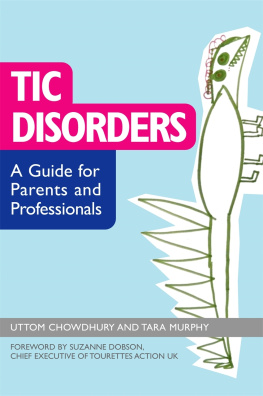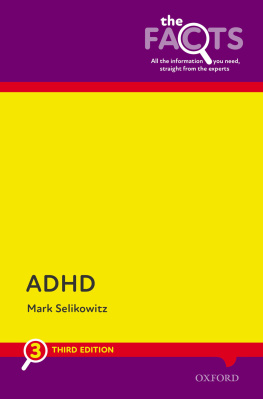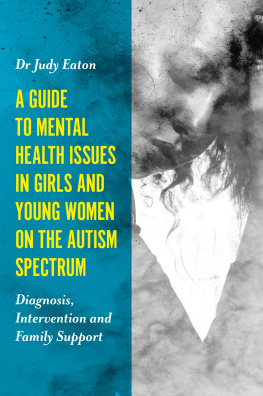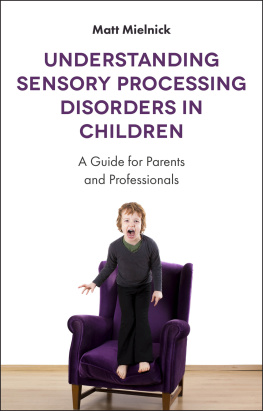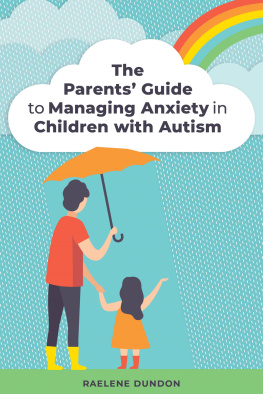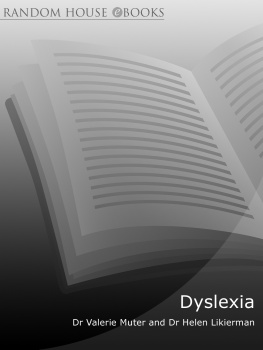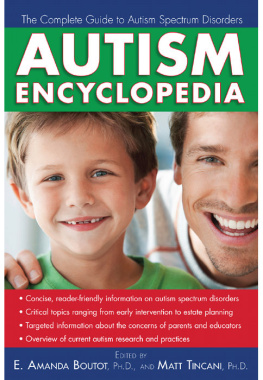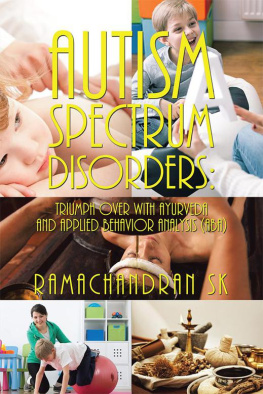
It is not always easy to understand what it is like to live with Tourette syndrome. Comprehensive and accessible, this book sheds light on the key clinical features, management strategies and implications to day-to-day life. The authors have done a great job in putting together a highly useful resource for patients and their families, as well as professionals and teachers dealing with this condition in the school setting.
Andrea E. Cavanna, MD PhD FRCP, Consultant in Behavioural Neurology
Uttom Chowdhury and Tara Murphy have been committed for years to the care of children and families affected by Tourette syndrome and have trained many other clinicians. This book combines the medical literature with their experience of the condition, its challenges and its treatment, including in the home and classroom. It will be a valuable resource for both parents and professionals.
Dr Jeremy Stern, Consultant Neurologist and Honorary Medical Director, Tourettes Action
This accessible book from experienced clinicians helps families live with and accept tics. At the same time it provides guidance to enable parents to make the best use of professional advice and expect a high standard of assessment and treatment for their child. It acknowledges and explains the neurological basis of tics and Tourettes but avoids excessive preoccupation with the unusual symptoms. It also gently dismisses the myth that doctors have a full answer to tics and Tourettes. Instead the emphasis is on families learning to identify and access the help they need. Part of this process is realising that their childs difficulties may not be the tics themselves, but a related problem such as anxiety or learning difficulties. There are practical tips for families throughout with the repeated message that knowledge is power.
Professor Isobel Heyman, Clinical Lead, National Tourette Syndrome Clinic, Great Ormond Street Hospital, London
of related interest
Why Do You Do That?
A Book about Tourette Syndrome for Children and Young People
Uttom Chowdhury and Mary Robertson
Illustrated by Liz Whallett
ISBN 978 1 84310 395 0
eISBN 978 1 84642 491 5
Disorganized Children
A Guide for Parents and Professionals
Edited by Samuel M. Stein and Uttom Chowdhury
ISBN 978 1 84310 148 2
eISBN 978 1 84642 496 0
Can I tell you about Tourette Syndrome?
A guide for friends, family and professionals
Mal Leicester
Illustrated by Apsley
ISBN 978 1 84905 407 2
eISBN 978 0 85700 806 0
Part of the Can I tell you about? series
Kids in the Syndrome Mix of ADHD, LD, Autism Spectrum, Tourettes, Anxiety, and More!
The one-stop guide for parents, teachers, and other professionals
Martin L. Kutscher, MD
With contributions from Tony Attwood, PhD and Robert R. Wolff, MD
ISBN 978 1 84905 967 1
eISBN 978 0 85700 882 4
The Parents Guide to Specific Learning Difficulties
Information, Advice and Practical Tips
Veronica Bidwell
ISBN 978 1 78592 040 0
eISBN 978 1 78450 308 6
PANDAS and PANS in School Settings
A Handbook for Educators
Edited by Patricia Rice Doran
ISBN 978 1 84905 744 8
eISBN 978 1 78450 166 2
TIC
DISORDERS
A Guide for Parents and Professionals
UTTOM CHOWDHURY AND TARA MURPHY
FOREWORD BY SUZANNE DOBSON
CHIEF EXECUTIVE OF TOURETTES ACTION UK

Jessica Kingsley Publishers
London and Philadelphia
First published in 2017
by Jessica Kingsley Publishers
73 Collier Street
London N1 9BE, UK
and
400 Market Street, Suite 400
Philadelphia, PA 19106, USA
www.jkp.com
Copyright Uttom Chowdhury and Tara Murphy 2017
Foreword copyright Suzanne Dobson 2017
Illustrations 2.1, 2.2, 4.1, 16.1, 16.2, 16.3, 16.4, 16.5, 19.1 copyright Damon Millar 2017
Front cover image source: Damon Millar.
All rights reserved. No part of this publication may be reproduced in any material form (including photocopying, storing in any medium by electronic means or transmitting) without the written permission of the copyright owner except in accordance with the provisions of the law or under terms of a licence issued in the UK by the Copyright Licensing Agency Ltd. www.cla.co.uk or in overseas territories by the relevant reproduction rights organisation, for details see www.ifrro.org. Applications for the copyright owners written permission to reproduce any part of this publication should be addressed to the publisher.
Warning: The doing of an unauthorised act in relation to a copyright work may result in both a civil claim for damages and criminal prosecution.
Library of Congress Cataloging in Publication Data
Names: Chowdhury, Uttom, 1967- author. | Murphy, Tara, 1976- author.
Title: Tic disorders : a guide for parents and professionals / Uttom Chowdhury and Tara Murphy ; foreword by Suzanne Dobson.
Description: London ; Philadelphia : Jessica Kingsley Publishers, 2017. | Includes bibliographical references and index.
Identifiers: LCCN 2016019281 | ISBN 9781849050616 (alk. paper)
Subjects: LCSH: Tourette syndrome in children--Popular works. | Tic disorders--Popular works.
Classification: LCC RJ496.T68 C472 2017 | DDC 618.92/83--dc23 LC record available at https://urldefense.proofpoint.com/v2/url?u=https-3A__lccn.loc.gov_2016019281&d=BQIFAg&c=euGZstcaTDllvimEN8b7jXrwqOf-v5A_CdpgnVfiiMM&r=VCKr2NBFNTs4O_kp07esGY2J-doQEb4zTq5sCaeXa-I&m=ifP7-ROy6p1CpfWa41fzyzvq5ixvRc6-TZ7OOij0VfQ&s=91cao7lt-IPCfNMocMJIQf6yyz94M5tdMO7R3ls2y30&e=
British Library Cataloguing in Publication Data
A CIP catalogue record for this book is available from the British Library
ISBN 978 1 84905 061 6
eISBN 978 0 85700 917 3
For Ruth, Sacha, Max and Mia.
For Linda and Patrick Murphy.
Contents
Acknowledgements
I would like to thank all the children and parents I have met in various clinics and support groups over the last 20 years. I have learnt, and continue to learn, so much from working alongside the families I have met.
Uttom Chowdhury
April 2016
I wish to thank Kate McCullagh and Zeeniya Bryan, parents who kindly reviewed an earlier version of this book, and gave enormously helpful feedback.
I am also grateful to Suzanne Dobson for reviewing the text and also Tourettes Action for supporting the development and dissemination of behavioural treatments for tic disorders (amongst other areas) here in the UK. Although there is still much work to do, we have come a long way.
I am keen to acknowledge my colleagues in the scientific community for collaboration but also for moving forward with a better informed understanding of Tourette syndrome from these colleagues I gain understanding and confidence. I am indebted to our team at Great Ormond Street Hospital and in particular my friend and colleague Professor Isobel Heyman, Consultant Child Psychiatrist, from whom I have learnt and continue to learn a great deal. However, the main inspiration for the book came from the children and their families at the Tourette syndrome clinic at Great Ormond Street Hospital NHS Foundation Trust who have taught me so much and make it all worthwhile.
Finally, I am indebted to my husband, Damon Millar, who gives me inspiration, love and a sense of what can be.
Tara Murphy
April 2016
Foreword
I was delighted when Tara and Uttom decided to write this book and even more delighted to be asked to write a few words by way of introduction.
Tics and Tourette syndrome (TS) are perhaps the most difficult of the neurological conditions to understand. Their strange and constantly changing nature causes more misunderstanding amongst the general public and the beleaguered GP than anything else, and this leads to an increase in fear and stigma and a lack of treatment, which just adds to the difficulties of people living with the syndrome. From our helpline at Tourettes Action we know that there are three main stages to understanding TS. First, parents tell us, they begin to notice that their child is not doing the same as his peers at about five years of age; for a while they worry and try to help their child not do these strange things; then they worry some more and begin to search the internet: could it be? Surely not but maybe. Second, the parents might phone the Tourettes Action helpline where someone will explain the symptoms and criteria and offer to send a list of specialists in Tourette. We suggest a visit to their GP to ask his opinion and for a referral to a specialist. It is at this, the third stage, that there is sometimes a slight hiccup; the GP may say, Its not TS he isnt swearing. It is hoped, however, that the child is referred to a specialist who can advise the family, who can then begin the journey of acceptance and management.
Next page
